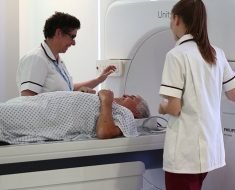The study covered in this summary was published on researchsquare.com as a preprint and has not yet been peer reviewed.
Key Takeaway
-
In patients with epidermal growth factor receptor (EGFR) TP53-mutated non–small cell lung cancer (NSCLC), combining a tyrosine kinase inhibitor (TKI) with antiangiogenic therapy or chemotherapy led to better progression-free survival (PFS) than a TKI alone.
Why This Matters
-
Typically, these patients have a poor prognosis.
-
Adding an antiangiogenic agent or chemotherapy to TKI therapy may prolong the PFS in this patient population.
Study Design
-
The study included 124 patients with advanced NSCLC as well as EGFR and TP53 mutations from a single center in China.
-
Overall, 72 patients received EGFR-TKIs combined with antiangiogenic drugs (22 patients) or chemotherapy (50 patients). Among those who were given an antiangiogenic agent, 12 received anlotinib, and 10 received bevacizumab.
-
The remaining 52 patients underwent EGFR-TKI monotherapy.
-
The primary endpoint was PFS.
Key Results
-
The median PFS was significantly longer in the combination therapy group (18.0 months vs 7.0 months; P < .001).
-
In the combination group, 89% of patients were alive and progression-free at the 6-month mark, compared with 71% in the EGFR-TKI group.
-
At 12 months, the rates were 62% in the combination group and 24% in the monotherapy group.
Limitations
-
The study was retrospective, and few patients had BRAC1 and MYC mutations compared with other mutations
-
The authors used a single accrual center for data collection.
-
The study did not report adverse effects, owing to incomplete medical records.
Disclosures
-
The study was supported by the National Natural Science Foundation of China.
-
The authors did not report any conflicts of interest.
This is a summary of a preprint research study, “Optimal Therapy for Concomitant EGFR and TP53 Mutated Non–Small Cell Lung Cancer: A Real-world Study.” The study has not been peer reviewed. The full text can be found at researchsquare.com.
For more news, follow Medscape on Facebook, Twitter, Instagram, and YouTube.
Source: Read Full Article





